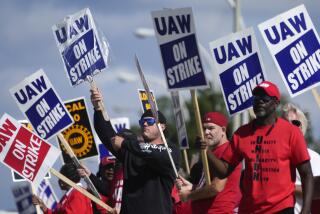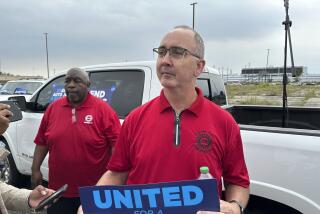COLUMN LEFT/ MARTIN MAYER : Turning the Wheels for a Better Deal : Workers mistrust government, sensing that it regards them as disposable servants.
In 1911, on the occasion of a strike in England, the Catholic populisK. Chesterton wrote a bit of doggerel verse about King Dives walking in his garden in an unfamiliar silence. Dives wondered why the machinery of the mills had stopped, and heard a chorus of voices from beneath the ground:
Call upon the wheels, master, call upon the wheels;
We are taking rest, master, finding how it feels,
Strict the law of thine and mine: theft we ever shun--
All the wheels are thine, master--tell the wheels to run!
The verse comes to my mind whenever I hear some panjandrum of the Treasury or governor of the Federal Reserve--or, indeed, President of the United States--wondering why Americans don’t feel any confidence in the economy. They lack confidence because they feel that nobody is taking care of them.
In the last dozen years of emphasis on the “supply side,” Americans have learned that their government sees them as servants, sometimes superfluous servants, of the wheels. They hear the bells tolling for the 30,000 layoffs at IBM, the closing of Willow Run, the restructurings at the banks, and they understand that these bells toll for them. King Dives tells them to return to the stores, to shop till they drop, to turn the wheels again--but they have other things on their minds.
A few months ago, the chairman of General Motors told an appreciative audience of institutional shareholders that his exclusive goal was going to be the profitability of the enterprise. Not the performance of the work force or the quality of the product or the satisfaction of the consumers or the reputation of the brand--just the profitability of the company, quarter by quarter. To that end, one closes factories, freezes salaries, reduces medical coverage, out-sources parts to get the cheapest stuff to put in the cars--and writes pink slips wherever possible. The market loved the speech, and the price of GM stock quickly rose by 40%. But such actions do not build confidence. When the market rewards the management that reduces the head count, the heads get nervous, and exhortation doesn’t cheer them up.
More than a century ago, watching a similar quest for international “competitiveness” in a time of falling asset prices, Karl Marx posited an “iron law of capitalism” that would lead to the “immiseration” of the work force. It was the genius of America--the reason ours became the American century--that America proved him wrong. But for the last 20 years, their noses pressed against computer screens, the economists in our business schools have been trying to prove him right.
One of the functions of government in the United States has been to persuade enterprise that its constituency is wider than just the entrepreneurs. We promoted collective bargaining to remind management that workers are partners in production. We forbade deceptive advertising to give consumers confidence that what they saw bore a reasonable resemblance to what they got. We limited the emissions of smokestacks and controlled the flow of effluent into our rivers to make manufacturers better neighbors.
The question about taxes, surely, is not whether they are high or low but whether the community gets its money’s worth from paying them. Taxes much diminished from what we now pay would still be a rip-off as the price of the government President Bush would like to give us.On the other hand, it isn’t impossible--unlikely, but not impossible--that a Clinton or a Perot presidency would renew good feeling about government and the country, and about what good government can do for the country. If Americans began to feel once again that the government they elect is on their side, government might be a bargain even at the price of additional taxes.
“The fundamental function of the law,” McGeorge Bundy once said, “is to prevent the natural unfairness of society from becoming intolerable.” For a quarter of a century, we have had federal governments that believe unfairness is perfectly OK so long as you can make out any kind of a case that it’s natural.
An ever-increasing proportion of the population feels the unfairness of government and behaves accordingly. The wheels jam. The roots of this recession, in other words, are profoundly political, and only a political change will get us out of it.
More to Read
Inside the business of entertainment
The Wide Shot brings you news, analysis and insights on everything from streaming wars to production — and what it all means for the future.
You may occasionally receive promotional content from the Los Angeles Times.










